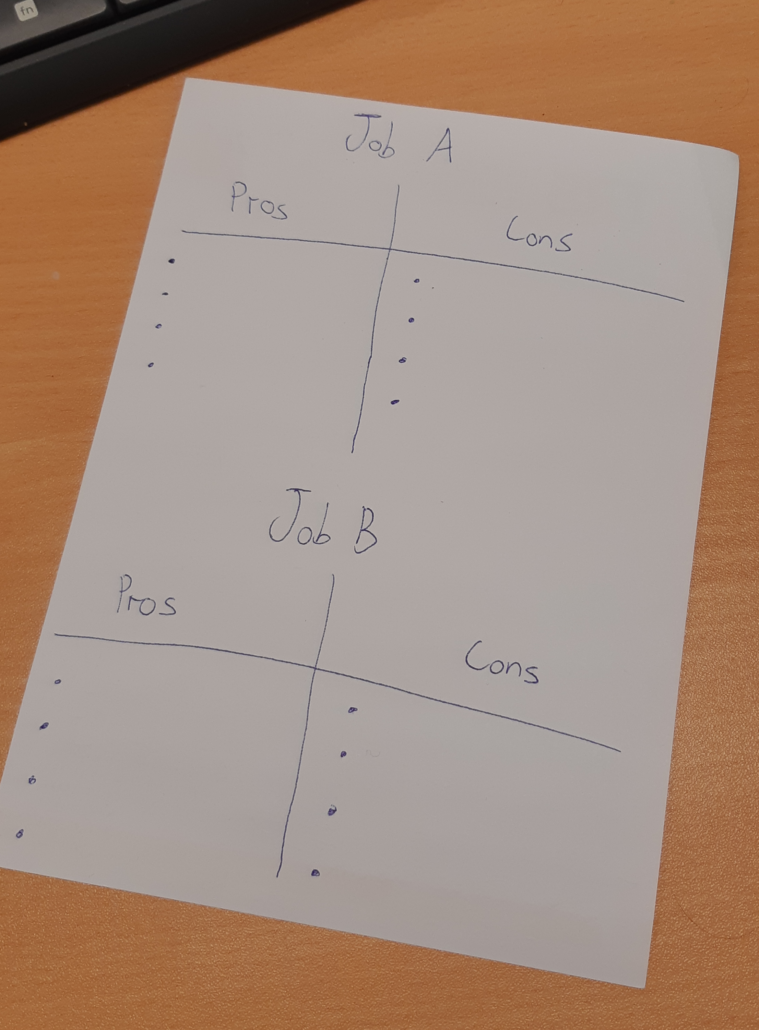Dealing with Multiple Job Offers
Having multiple job offers on the table can be a tricky situation to navigate. Generally speaking, it’s not a situation you prepare for when you’re job hunting, as you don’t expect it to actually happen. However, as we’ve seen throughout the 23 years that we’ve been operating, it happens more often than you’d expect. How do you deal with two companies that want to hire you? How do you manage a job offer from one company while you’re interviewing for another that you’d prefer to work for? Read on and we’ll do our best to steer you in the right direction!
Lets have a look at the main factors that one should consider when they have two job offers sitting in front of them.
Money makes the world go around
Lets get the most obvious factor out of the way. But just because it’s the most obvious, does that make it the most important? Contrary to the conclusion some may jump to, you don’t always want to take the job that’s offering the largest remuneration package.
You always have to weigh up the salary against other factors. The larger the gap between the two offers, the larger the impact that salary is going to have on your decision. Furthermore, each person’s lifestyle wants and needs are different. For example, perhaps you’ve got a family and therefore work-life balance is the most important thing for you to get right. A salary difference of a couple thousand NZD isn’t going to sway your decision as much as a lesser commute to work or more flexible hours might. However, if your partner isn’t working and you’re the sole breadwinner, then that small difference is now suddenly much more important.
Every person’s priorities are different, but when it comes to salary, don’t let the dollar signs blind you from the other factors that need to be just as carefully weighed up.
Location, Location, Location
Location can, and often will, end up being more important than salary in a lot of cases. It’s almost an extension of salary in the sense that the mode of transport you take to work and the commute distance will inevitably cost you time and/or money. If one job is located just 5 minutes from where you live, but the other is located an hour away by car, you may find the job closer to home more attractive even if the salary on offer is slightly lower. Time is money, after all.
Personally, I used to work at a job where a combination of walking to the bus stop, waiting for the bus and riding the bus to work would take over an hour. Occasionally I’d get a 9 hour shift that would actually take more than 11 hours out of my day because of the commute. Not to mention that all the bus fares added up quickly. By comparison, I now am only a 20 minute walk to work and am much happier due to the time and money that I’ve been able to save.
Hit the books and surf the web
Do some research on the companies that have offered you work. Does one have a significantly better reputation than the other? Is one likely to have colleagues that you’ll get on with better? If you can discern it from online research, which company has a lower staff turnover? Asking (and answering) all of these questions will help better inform you as to which job to take. For some people, the culture of the organisation will make or break their experience with the organisation. Not enough job applicants consider the culture of the company before joining the team, only to find later on that it’s not what they hoped it would be like.
Also consider the size of the organisations. A large corporate may give you more promotion opportunities down the line and a variety of neat perks. However, a smaller organisation may be able to give you more 1 on 1 training and offer a more ‘close-knit’ team culture where you feel more valued.
Play for the long game

You don’t need a crystal ball, but you do need to be able to envisage what a future in a role may look like.
Something worth considering is the degree of job security that each job promises. This will vary from industry to industry, and from company to company. For example, if you’re in the Construction industry, you’re probably more concerned about the volatility of the market than if you’re in the Pharmaceutical industry.
Also try to look ahead into the future – can you see yourself working at both jobs for a long time? Does one seem like it might be too intense or demanding to maintain for the long-term? Or does it perhaps include a duty that you’re less thrilled about doing than the other job?
What do you want?

Picture Ryan Gosling screaming it at you any time you’re faced with having to choose between two things. It helps, I swear.
Something that not enough people ask themselves is if the job they’re signing on for is going to be fulfilling. That feeling of making a difference, or contributing to something worthwhile, is often the reason a lot of people pass up an opportunity that is paying more or that is a shorter commute from home.
A big part of being happy in life in general, is being happy at work. Job fulfillment comes into that, as does your ability to ‘gel’ with your colleagues. There’s also something to be said for the satisfaction that comes from being challenged by the role – by just the right amount. You ideally want to be bettering yourself and learning new things every so often as you go.
Okay great, but I need a second opinion or more time!
If you’re faced with multiple job offers right now, here’s some steps you should take:
- Talk to your recruiter. If you’ve received one of these job applications through a recruiter, you will want their insight on the situation. Any recruiter worth their salt will give you honest, impartial advice as to how to navigate the situation best. Obviously you should expect your recruiter to advocate the position you’ve applied for through them, but bear in mind that they’ve done the hard yards as far as vetting the company and its senior management. They’ll be sure that you’re the right fit for the team and they’ll be able to check in with you after you start and see how you’re getting on.
- Read the job descriptions carefully and make a pro/con list based on those descriptions plus anything you learned in during the interview process. Use the sections above to weigh up which position has more going for it.
- If you’ve been offered a position, but you have another promising interview lined up, buy time by politely requesting a written offer from the first company (provided all you have is a verbal offer). If you feel you can, honesty could be the best policy. Express to the first company that they’re your preferred option but that you have another interview to attend before you can accept. An empathetic employer that genuinely wants you to join their team should understand.
Have you ever been offered two jobs at once? How did you handle the situation? Leave a comment below or on LinkedIn!
Article by Dario Luca, Marketing Coordinator



















Leave a Reply
Want to join the discussion?Feel free to contribute!